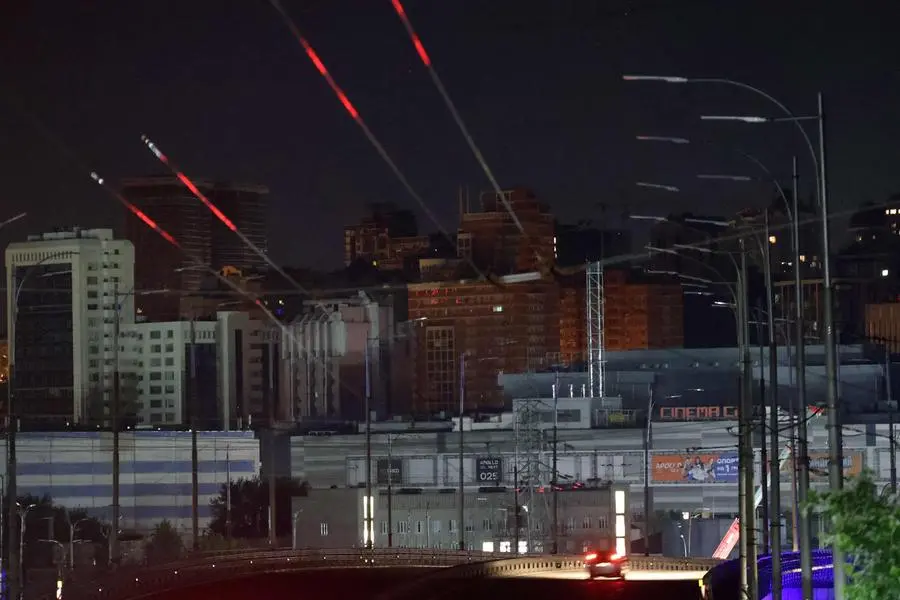PHOTO
Staff at Kyiv's beloved puppet theatre had prepared for months to launch their latest premiere in early June. Then the Russian strikes picked up, and the theatre's electricity supply shut off.
The surge in missile and drone attacks on Ukrainian power plants over recent weeks has plunged whole districts of the capital into darkness for hours on end and forced difficult choices on residents exhausted by more than two years of war.
The theatre postponed the performance until late June hoping a solution would materialise, but with the deadline approaching and officials warning that repairs could take years, its director was slowly reckoning with the scale of their problem.
"We have to dig in and think about how to become more autonomous from the city's grid," director Igor Guly said.
The soft-spoken 31-year-old mused aloud about the possibility of installing solar panels or fundraising for an industrial-scale generator.
Whatever the solution, the theatre would likely be left to its own devices to find it, he suggested.
"Whoever is able to be independent in this situation will be successful," he said in his office during an hours-long outage.
President Volodymyr Zelensky has said the systematic bombardments have knocked out half of the country's generation capacity compared to one year ago.
- 'Gritting our teeth' -
Authorities have decided to ration electricity consumption across the country -- introducing long outages -- and import emergency supplies from Romania, Poland and Hungary to make up shortfalls.
Energy officials have said it could take years and billions of dollars to complete repairs.
In Kyiv, industry observers have reported a bump in customers at the capital's restaurants and cafes. Many had installed generators after a wave of Russian strikes crippled the grid last year.
Ivan Panchuk, the chef at Kanapa, said his restaurant had altered its menu, begun using wood-burning grills, and was now sometimes serving patrons by candlelight.
"The kitchen has adapted. We were ready for it," he said.
The founder of a restaurant chain in Ukraine, Dmytro Borysov said his businesses were using generators purchased during the earlier outages and acknowledged long-term solutions were needed.
"We'll make some decision and come up with something more systemic, an autonomous power supply," he said.
"So we work with a smile, gritting our teeth."
Across Kyiv, residents are adjusting to their new reality by planning when they will use elevators in high-rise buildings, or sharing tips online on keeping freezers and fridges cool even during the outages.
Pointing to the locals' resignation to their new reality, theatre director Guly said ticket holders had been understanding when the puppet premiere was postponed.
- 'Do we have any option?' -
"We'll come back another day. Hang tight," was how he summarised the reaction from the audience. "There were no questions," he said.
Prime Minister Denys Shmygal has urged officials to turn off air conditioners in government buildings and called on regional authorities to limit street lighting.
The Kremlin denies its forces target civilian infrastructure but the defence ministry has also said it carried out retaliatory strikes on Ukrainian energy sites.
Kyiv has outlined a five-point strategy to weather the storm, including electricity rationing, urging help from abroad, receiving more air defence systems, and overhauling the grid.
Zelensky this week said Ukraine needed "quick" and "cost-effective" repair work ahead of winter.
"We need your equipment and financial support to respond now and maintain normal life," he told a reconstruction conference in Berlin.
At the puppet theatre, where production assistants were crafting props and stage decorations by candlelight, chief artist Mykola Danko said normal life was unlikely to return soon.
He said the Russian invasion had upended the theatre's ability to plan performances, allocate costs and resources -- and he put into stark terms the answer to the problem.
"Do we have any options? We have to live with it somehow. There is only one option -- winning the war," he said.





















